President of Tajikistan Emomali Rahmon meets with President of the European Council Antonio Costa
Read also
On April 3, in the city of Samarkand, on the sidelines of the “Central Asia and the European Union” Summit, the President of the Republic of Tajikistan, Leader of the Nation, Honorable Emomali Rahmon, met with the President of the European Council, Honorable Antonio Costa.
The meeting discussed issues of cooperation between Tajikistan and the European Union.
The President of the country, Honorable Emomali Rahmon, emphasized that “we consider the European Union to be one of our important partners in the international arena.”
Antonio Costa stressed the importance of resolving border issues between Tajikistan, Kyrgyzstan, and Uzbekistan, and congratulated the Head of State and the people of Tajikistan on this historic event.
The parties exchanged views on the importance of the Enhanced Partnership and Cooperation Agreement between Tajikistan and the European Union, the coordination of which has reached the final stage.
The use of Tajikistan’s vast natural resources, hydropower, important raw materials, agricultural, industrial and transit potential was considered beneficial for the development of trade with the European Union.
The cooperation between the two sides in the process of reform, development of the energy sector, reconstruction and construction of hydropower facilities was called an example of a stable partnership.
It was noted that Tajikistan is interested in attracting European investment and technologies in the implementation of energy projects, including the construction of the Rogun hydroelectric power station and the reconstruction of the Nurek hydroelectric power station.
It was emphasized that Tajikistan is on the same page with the European Union in promoting the “green economy” policy. In this context, the Strategy for the development of the “green economy” of Tajikistan and the issue of the production and export of “green energy” were discussed.
An exchange of views took place on the development of cooperation in the fields of healthcare, social protection, education, the expansion of scholarship programs and further support for vocational education.
The need to continue cooperation between Tajikistan and the European Union within the framework of the BOMCA and CADAP programs was highlighted.
There was also a fruitful discussion on the increase in environmental disasters and the catastrophic consequences of climate change in the world and the implementation of Tajikistan’s global initiatives to address these problems.











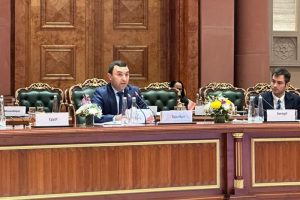 Tajikistan Promotes Digital Transformation Agenda at AI Impact Summit
Tajikistan Promotes Digital Transformation Agenda at AI Impact Summit Tajikistan Expands AI Cooperation with Google DeepMind
Tajikistan Expands AI Cooperation with Google DeepMind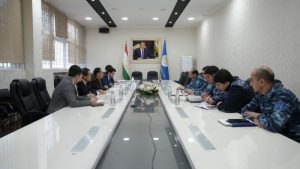 Tajik Customs, Japanese Firm Sign Deal on Cargo Scanning Upgrade Project
Tajik Customs, Japanese Firm Sign Deal on Cargo Scanning Upgrade Project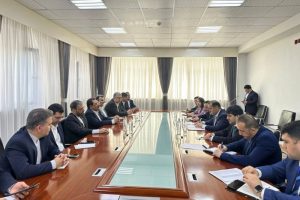 Tajikistan, Iran Discuss Boosting Direct Investment Cooperation
Tajikistan, Iran Discuss Boosting Direct Investment Cooperation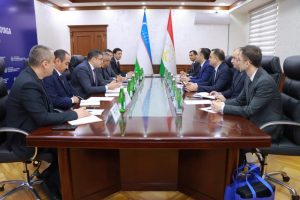 Tajik and Uzbek Anti-Corruption Agencies Discuss Expanding Cooperation
Tajik and Uzbek Anti-Corruption Agencies Discuss Expanding Cooperation Starlink Satellite Internet Launches in Tajikistan
Starlink Satellite Internet Launches in Tajikistan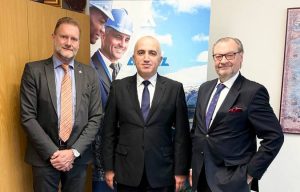 Austrian Company Andritz Hydro Seeks to Expand Cooperation with Tajikistan
Austrian Company Andritz Hydro Seeks to Expand Cooperation with Tajikistan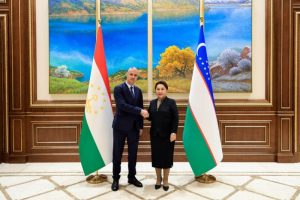 Ambassador of Tajikistan Meets with Chairperson of the Senate of Uzbekistan
Ambassador of Tajikistan Meets with Chairperson of the Senate of Uzbekistan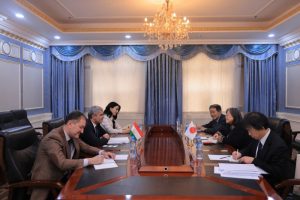 Tajikistan and Japan Discuss Cooperation within Regional and International Organizations
Tajikistan and Japan Discuss Cooperation within Regional and International Organizations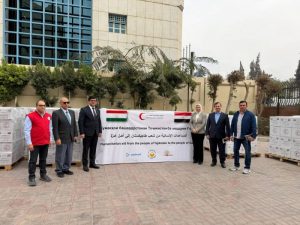 Tajikistan’s Humanitarian Aid to the People of Gaza
Tajikistan’s Humanitarian Aid to the People of Gaza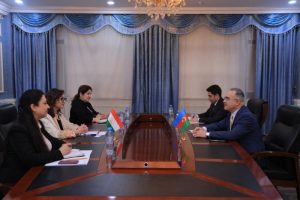 Bilateral Cooperation Between Tajikistan and Azerbaijan Discussed in Dushanbe
Bilateral Cooperation Between Tajikistan and Azerbaijan Discussed in Dushanbe Tajikistan Establishes Data Protection Center to Strengthen Cybersecurity
Tajikistan Establishes Data Protection Center to Strengthen Cybersecurity














